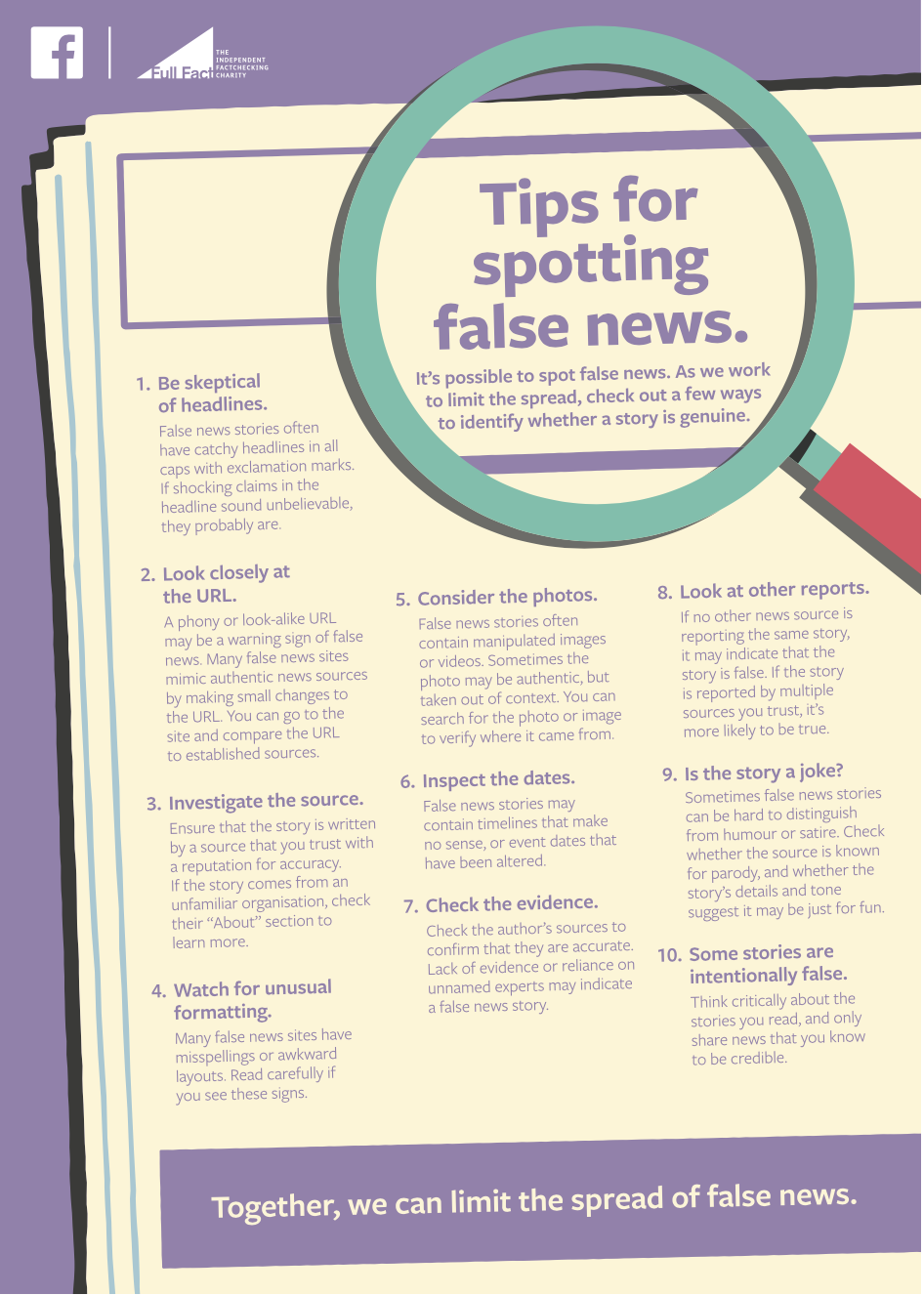Facebook cracks down on fake news accounts
Social network takes down fake profiles and runs awareness ads


Sign up today and you will receive a free copy of our Future Focus 2025 report - the leading guidance on AI, cybersecurity and other IT challenges as per 700+ senior executives
You are now subscribed
Your newsletter sign-up was successful
Facebook banned accounts and ran "educational adverts" in British newspapers today in its latest effort to tackle fake news.
The social network's adverts appeared in newspapers such as The Guardian, The Times and The Daily Telegraph, and are the same tips which were recently published at the top of users' news feeds. They include being sceptical of headlines, looking at other reports and investigating the source of the article.

Furthermore, Facebook has also removed tens of thousands of fake accounts and has made improvements to its system to recognise these types of accounts by identifying patterns of activity. This is done by detecting repeated posting of the same content or an increase in the amount of messages sent. Facebook hopes this will reduce the spread of material generated through inauthentic activity including spam and misinformation.
Facebook's director of policy for the UK, Simon Milner, said: "People want to see accurate information on Facebook and so do we. That is why we are doing everything we can to tackle the problem of false news. We have developed new ways to identify and remove fake accounts that might be spreading false news so that we get to the root of the problem."
The company will also start testing a new feature in the UK which aims to change the ranking of articles which are read but not shared on people's news feeds. Facebook thinks this behaviour may be a sign that a story has misled people, so it will have a lower ranking on the site.
Lastly, Facebook has teamed up with Google to run a fact checking partnership, working with major newsrooms to address rumours and misinformation spread online during the general election. They will be announcing more details soon.
Milner added: "To help people spot false news we are showing tips to everyone on Facebook on how to identify if something they see is false. We can't solve this problem alone so we are supporting third party fact checkers during the election in their work with news organisations, so they can independently assess facts and stories".
Sign up today and you will receive a free copy of our Future Focus 2025 report - the leading guidance on AI, cybersecurity and other IT challenges as per 700+ senior executives
This follows on from the tech giants' announcement in April to combat fake news. MP Damian Collins also criticised Facebook last month for not carrying out sufficient measures to fight fake news ahead of the UK general election on 8 June.
Collins said today: "I welcome the measures announced by Facebook this morning to address #fakenews Education is key, but is no silver bullet."
Picture credit: Facebook
Zach Marzouk is a former ITPro, CloudPro, and ChannelPro staff writer, covering topics like security, privacy, worker rights, and startups, primarily in the Asia Pacific and the US regions. Zach joined ITPro in 2017 where he was introduced to the world of B2B technology as a junior staff writer, before he returned to Argentina in 2018, working in communications and as a copywriter. In 2021, he made his way back to ITPro as a staff writer during the pandemic, before joining the world of freelance in 2022.
-
 Anthropic promises ‘Opus-level’ reasoning with new Claude Sonnet 4.6 model
Anthropic promises ‘Opus-level’ reasoning with new Claude Sonnet 4.6 modelNews The latest addition to the Claude family is explicitly intended to power AI agents, with pricing and capabilities designed to attract enterprise attention
-
 Researchers call on password managers to beef up defenses
Researchers call on password managers to beef up defensesNews Analysts at ETH Zurich called for cryptographic standard improvements after a host of password managers were found lacking
-
 Meta to pay $725 million in Cambridge Analytica lawsuit settlement
Meta to pay $725 million in Cambridge Analytica lawsuit settlementNews The settlement closes the long-running lawsuit into how Facebook's owner, Meta, handled the Cambridge Analytica scandal
-
 Meta's earnings are 'cause for concern' and 2023 looks even bleaker
Meta's earnings are 'cause for concern' and 2023 looks even bleakerAnalysis Calls for investor faith in metaverse tech only emphasise the worries that its investment strategy won't pay off
-
 Microsoft and Meta announce integration deal between Teams and Workplace
Microsoft and Meta announce integration deal between Teams and WorkplaceNews Features from both business collaboration platforms will be available to users without having to switch apps
-
 Facebook is shutting down its controversial facial recognition system
Facebook is shutting down its controversial facial recognition systemNews The move will see more than a billion facial templates removed from Facebook's records amid a push for more private applications of the technology
-
 'Changing name to Meat': Industry reacts to Facebook's Meta rebrand
'Changing name to Meat': Industry reacts to Facebook's Meta rebrandNews The rebrand attempts to provide a clearer distinction between Facebook and its umbrella company
-
 Facebook's Oversight Board demands more transparency
Facebook's Oversight Board demands more transparencyNews Board bashed the social media giant for its preferential treatment of certain high-profile accounts
-
 Facebook claims AI managed to reduce hate speech by 50%
Facebook claims AI managed to reduce hate speech by 50%News The social media platform has hit back at claims the tech it uses to fight hate speech is inadequate
-
 Facebook to hire 10,000 workers across the EU
Facebook to hire 10,000 workers across the EUNews The high-skilled jobs drive is a “vote of confidence” in the European tech industry
